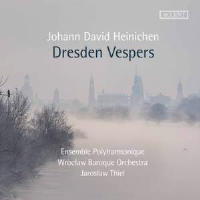Texte paru dans: / Appeared in: |
|
|
Outil de traduction |
|
|
Unlike his close contemporary Telemann, Johann David Heinichen actually finished his law degree at Leipzig University before switching to a career in music. After spending six years in Italy (mostly in Venice), he was appointed Kapellmeister at the Dresden court’s Roman Catholic chapel. Ensemble Polyharmonique’s eight singers and the Wroc?aw Baroque Orchestra present an imaginary glimpse of vespers music as it might have been on December 3, 1724, for the feast of St Francis Xavier, one of the early 16th-century founders of the Jesuits chosen as the patron saint of the House of Wettin by Princess Maria Josepha (a Habsburg who married the Prince-Elector in 1719). Five psalms, a vesper hymn, a Magnificat, a Marian antiphon and a litany for St Francis Xavier composed during the early 1720s are recorded here for the first time. The rest of the liturgy (plainchants and so on) is not included. There is Italianate theatricality in concise psalms that call for strings, oboes, bassoon and continuo (organ and theorbo). Dixit Dominus has a jaunty bass aria, ‘De torrente in via bibet’, sung charismatically by Cornelius Uhle. Seven voices and bustling lower strings in a quick Beatus vir in E flat have more than a whiff of Vivaldi and Lotti. Laudate pueri places a trio of soprano, alto and tenor singing coloratura solos within choral refrains, and its doxology moves from dulcet invocation to lightly treading counterpoint. A pair of chuckling oboes and effervescent strings combine neatly with assorted combinations of solo voices in Laudate Dominum. The G minor stile antico counterpoint in Iste confessor is sculpted beautifully by Ensemble Polyharmonique, supported subtly by organist Marcin Szelest. Within the 11-minute Magnificat in B flat there are multiple switches of mood, texture and resources – such as the sudden move to minor-key mysteriousness for countertenor Piotr Olech’s ‘Et misericordia ejus’, rushing scalic bass lines in Matthias Lutze’s declamatory ‘Deposuit potentes’, pastoral oboes and fully scored lyrical strings for tenor Johannes Gaubitz’s ‘Suscepit Israel’ and an elegantly balanced fugal closing chorus. A polished account of Alma redemptoris mater features an initial ritornello and harmonic surprises that remind me of a funeral march in Vivaldi’s opera Tito Manlio (Mantua, 1719). There are shaded nuances between sunlit elegance and sincerity in the Litaniae pro Festo Santi Fr Xaveri, performed with touching sincerity by adroitly balanced voices and sensitively understated orchestra – and the choral counterpoint with chromatic tinges in its concluding lines ‘miserere nobis’ is gorgeous stuff. |
|
_small.jpg)



